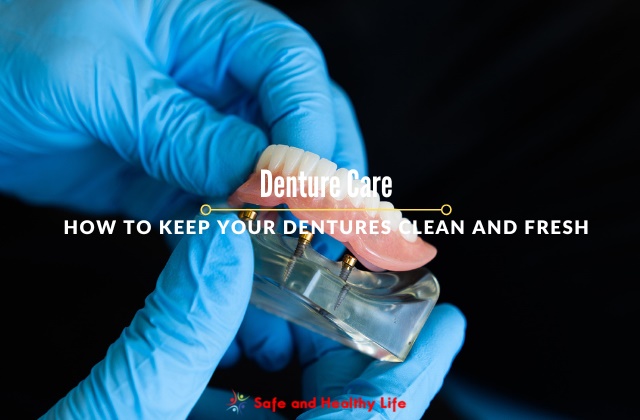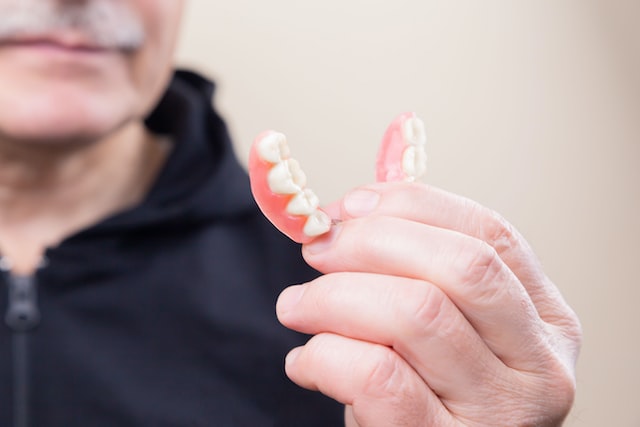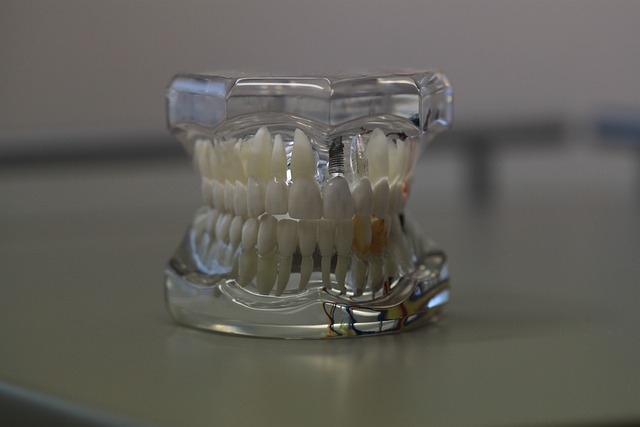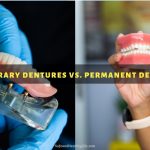
Dentures are a popular solution for people with missing teeth. They provide a full set of teeth and can give you a confident smile.
However, dentures require proper care and maintenance to ensure they last for a long time and look good.
This article will discuss the importance of proper denture care, types of dentures, and various techniques for cleaning and maintaining your dentures.
There are four types of dentures: full dentures, partial dentures, immediate dentures, and overdentures.
Full dentures are used when all the teeth are missing, while partial dentures are used when some of the teeth are missing. Immediate dentures are made in advance and can be placed as soon as the natural teeth are removed.
Overdentures are a type of denture that snaps onto existing teeth, click here to learn more.
Key Takeaways:
- Dentures require proper care and maintenance to ensure they last for a long time and look good.
- A daily cleaning routine should include brushing the dentures with a soft-bristled brush and mild soap and using specialized denture cleaning products such as tablets or soaking solutions.
- Removing stains and odors from dentures can be done by using a mixture of baking soda and water or soaking them in a solution of white vinegar and water.
- Sanitizing dentures is crucial, it can be done by soaking dentures in a solution of water and hydrogen peroxide or using specialized denture sanitizing products.
- Proper maintenance is essential for prolonging the life of your dentures and preventing damage, this includes handling them with care and storing them in a safe place, such as a denture case.
- Denture adjustment is an important part of maintaining the fit and comfort of your dentures, regular denture adjustments can help to prevent damage to the dentures and extend their life.
- Denture repair is necessary when dentures become damaged or worn out, it’s important to address these issues as soon as possible to prevent further damage and to extend the life of the dentures.
- It’s recommended to have your dentures checked by a professional every 6 months or as soon as you notice that they don’t fit as well as they used to.
- It’s important to store your dentures in a safe place, such as a denture case, to prevent damage and make sure they are kept in a dry place and not exposed to high temperatures or humidity.
Denture Cleaning Techniques

Photo Credit: Unsplash
Denture cleaning is an essential part of denture care. Daily cleaning should include brushing the dentures with a soft-bristled brush and mild soap.
It is important to avoid using abrasive products such as toothpaste, as it can scratch the surface of the dentures.
Additionally, it is recommended to use specialized denture cleaning products such as tablets or soaking solutions.
Removing stains and odors from dentures can be a bit tricky. Some common techniques include using a mixture of baking soda and water or soaking dentures in a solution of white vinegar and water.
However, it’s important to note that some materials can react negatively with certain cleaning products, so it’s always best to consult with a professional or the product’s instructions before attempting to remove stains or odors.
Sanitizing dentures is also crucial. Dentures can accumulate bacteria and germs over time, so it’s important to sanitize them regularly.
Soaking dentures in a solution of water and hydrogen peroxide or using specialized denture sanitizing products can help to kill germs and bacteria.
Denture Cleaning for Acrylic Dentures
Acrylic dentures are a popular choice for their durability and affordability. However, they can require extra care to maintain their appearance.
It’s recommended to use specialized cleaning products for acrylic dentures, such as tablets or soaking solutions.
Removing stains and odors from acrylic dentures can be done by using a mixture of baking soda and water or soaking them in a solution of white vinegar and water.
Sanitizing acrylic dentures can be done by soaking them in a solution of water and hydrogen peroxide or using specialized denture sanitizing products.
Denture Cleaning for Flexible Dentures
Flexible dentures are made of a flexible material that conforms to the shape of your mouth. They are comfortable to wear and require less maintenance compared to other types of dentures.
Cleaning flexible dentures can be done using specialized cleaning products such as tablets or soaking solutions.
Removing stains and odors can be done by using a mixture of baking soda and water or soaking them in a solution of white vinegar and water.
Sanitizing flexible dentures can be done by soaking them in a solution of water and hydrogen peroxide or using specialized denture sanitizing products.
| See also: Temporary Dentures vs. Permanent Dentures |
Denture Cleaning for Cast Metal Dentures
Cast metal dentures are made of a strong metal alloy that can withstand heavy biting and chewing. They are durable and long-lasting but require proper care to maintain their appearance.
Cleaning cast metal dentures can be done using specialized cleaning products such as tablets or soaking solutions.
Removing stains and odors can be done by using a mixture of baking soda and water or soaking them in a solution of white vinegar and water.
It’s important to note that cast metal dentures should not be soaked in hydrogen peroxide, as it can cause damage to the metal.
Instead, you can use specialized denture sanitizing products or simply rinse them thoroughly with water.
Denture Maintenance

Photo Credit: Pixabay
Proper maintenance is essential for prolonging the life of your dentures and preventing damage. The first step in maintaining your dentures is to handle them with care.
Avoid dropping or bending them; always use a soft-bristled brush to clean them.
Additionally, it’s important to store your dentures in a safe place, such as a denture case, to prevent damage.
Denture Adjustment
Denture adjustment is an important part of maintaining the fit and comfort of your dentures. Over time, dentures can become loose or uncomfortable due to changes in your mouth.
A denture professional can make adjustments to the dentures to improve fit and comfort. It’s important to note that regular denture adjustments can help to prevent damage to the dentures and extend their life.
Denture Repair
Denture repair is necessary when dentures become damaged or worn out. Common issues that can occur with dentures include cracks, chips, or broken teeth.
These issues can be fixed by a denture professional. It’s important to address these issues as soon as possible to prevent further damage and extend the life of the dentures.
Conclusion
Denture care and maintenance are essential for maintaining the health and appearance of your dentures. Proper cleaning and sanitizing, as well as regular maintenance and adjustments, can help extend your dentures’ life.
Remember to handle your dentures with care, and always address any issues that arise as soon as possible.
These tips will help keep your dentures clean, fresh, and in top shape.
Frequently Asked Questions
How often should I clean my dentures?
It’s recommended to clean your dentures daily, using a soft-bristled brush and mild soap. Additionally, it’s a good idea to use specialized denture cleanings products, such as tablets or soaking solutions, at least once a week.
Can I use toothpaste to clean my dentures?
Using toothpaste to clean your dentures is not recommended, as it can contain abrasive particles that can scratch the surface of the dentures. Instead, use mild soap or specialized denture cleaning products.
What is the best way to remove stains and odors from my dentures?
Common techniques for removing stains and odors include using a mixture of baking soda and water or soaking dentures in a solution of white vinegar and water.
However, it’s important to note that some materials can react negatively with certain cleaning products, so it’s always best to consult with a professional or the product’s instructions before attempting to remove stains or odors.
How do I sanitize my dentures?
Dentures can accumulate bacteria and germs over time, so it’s important to sanitize them regularly.
Soaking dentures in a solution of water and hydrogen peroxide or using specialized denture sanitizing products can help to kill germs and bacteria.
How often should I get my dentures adjusted?
The frequency of denture adjustments will depend on the individual. However, it’s a good idea to have your dentures checked by a professional every 6 months or as soon as you notice that they don’t fit as well as they used to.
Can I fix minor issues with my dentures myself?
It’s not recommended to attempt to fix minor issues with your dentures yourself, as it can cause further damage. It’s best to have a professional repair any issues with your dentures.
How do I store my dentures when I am not wearing them?
It’s important to store your dentures in a safe place, such as a denture case, to prevent damage. Also, make sure they are kept in a dry place and not exposed to high temperatures or humidity.
About The Author:
Stacey Smith is a freelance health writer. She is passionate to write about women’s health, dental health, diabetes, endocrinology, and nutrition and provides in-depth features on the latest in health news for medical clinics and health magazines.




